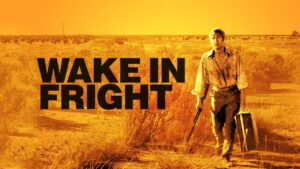.
Last night in preparation to listening to the podcast The Evolution of Horror‘s discussion I re-watched 1971’s Australian social horror Wake in Fright.
Spoilers
 The film, based on the novel of the same title by Kenneth Cook, follows young schoolteacher John Grant on his scorching Christmas vacation. After losing all his money gambling Grant is stranded in the town of Bundanyabba in the parched Australian outback. He descends into a multi-day drinking binge with local men, partakes in a cruel, vicious kangaroo hunt that is more slaughter than hunt, and a likely drunken homosexual assignation. After failing to kill himself and spending the rest of his vacation in hospital Grant return to the even smaller town where he teaches and rents a room answering queries with, yeah, he had a good holiday.
The film, based on the novel of the same title by Kenneth Cook, follows young schoolteacher John Grant on his scorching Christmas vacation. After losing all his money gambling Grant is stranded in the town of Bundanyabba in the parched Australian outback. He descends into a multi-day drinking binge with local men, partakes in a cruel, vicious kangaroo hunt that is more slaughter than hunt, and a likely drunken homosexual assignation. After failing to kill himself and spending the rest of his vacation in hospital Grant return to the even smaller town where he teaches and rents a room answering queries with, yeah, he had a good holiday.
From the moments we meet Grant silently waiting out the end of the school day so he can flee just like the children he teaches it’s clear that he harbors a deep disdain for the people of the outback. This is not alienated by the somewhat larger town of Bundayabba ‘The Yabba’ and he treats these townsfolk with similar condescension. Grant’s action however reveals him to be no more intelligent and in fact less so that the locals enjoying their drink and gambling when he loses all of his travel funds playing ‘Two-up.’ The ancient saying is that pride goes before the fall is concretely fact for the character of John Grant.
While the character displays a deep abiding disdain for the locals, he is shown repeatedly lacking the internal will to resist their peer pressure. He introduces himself as John Grant but when the local cop more than once calls him ‘jack’ a common enough nickname for people named John, Grant never corrects him, despite never during his staying introducing himself that way. Again and again Grant when pressed by other men caves to the pressure to drink, a strong indication that internally Grant is incomplete and possibly at war with himself.
During an evening of binge drinking Grant is led for a nighttime stroll by the adult daughter of one his mates. Janette in a direct and forward manner attempts to seduce Grant into sexual intercourse but after wordlessly and timidly complying he is unable to perform, scrambling off the prone woman to vomit. It is interesting that in a film that stays with John during his multiday alcoholic binge and takes to the effort to deal with going to the toilet the only depiction of retching is when he is sexually engaged with the film’s only substantial female character. Even after his same-sex drunken encounter where many movies would insert a reference to the character vomiting, Wake in Fright does not. John Grant’s sexuality is left an unanswered question with a very reasonable interpretation being that he is deeply closeted and in the hyper-masculine world of the Australian Outback quite self-loathing.
Masculinity plays an important element in Wake in Fright. It is always men who insist on John joining them in drinking. It is men who question why John would prefer talking with a woman to drinking. It is to men that John seems always trying to prove himself with boasts of his skill with a rifle and eventually with his attempt to match their physical prowess wrestling with and slaughter by hand with a knife an injured and immature kangaroo. John’s holiday plans had apparently been to travel to Sydney and be with Robin and yet the entire time he is stranded in ‘the Yabba’ he never attempts to call her for assistance. In the novel is apparently clear that the phot he carries is of a woman he has seen, knows somewhat but is not romantically involved with. The film never directly touches on this fantasy of a romantic relationship, but his visions of ‘Robin’ are never full scenes but something more like a teenager’s imaginings. It is what John Grant thinks being masculine is and something he can’t achieve.
Wake in Fright ends ambiguously on the nature of Grant’s character. The audience has no clue is his comment that he enjoyed his vacation was simply a polite but meaningless response or if in retrospect he did enjoy his sojourn to ‘the Yabba.’ There are dramatic gestures such as tearing up the photograph of Robin or any overly emotional reaction to the town on his return. Any change, revelation, or acceptance of Grant’s character by Grant is purely internal for John Grant alone.

